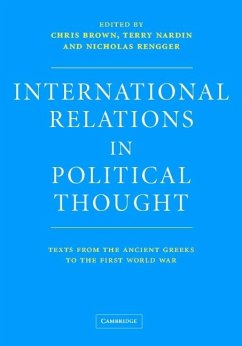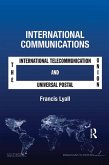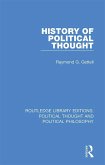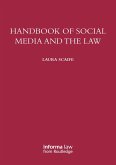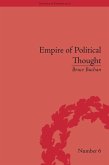International Relations in Political Thought (eBook, ePUB)
Texts from the Ancient Greeks to the First World War
Redaktion: Brown, Chris


Alle Infos zum eBook verschenken

International Relations in Political Thought (eBook, ePUB)
Texts from the Ancient Greeks to the First World War
Redaktion: Brown, Chris
- Format: ePub
- Merkliste
- Auf die Merkliste
- Bewerten Bewerten
- Teilen
- Produkt teilen
- Produkterinnerung
- Produkterinnerung

Hier können Sie sich einloggen

Bitte loggen Sie sich zunächst in Ihr Kundenkonto ein oder registrieren Sie sich bei bücher.de, um das eBook-Abo tolino select nutzen zu können.
This unique collection presents texts in international relations from Ancient Greece to the First World War. Major writers such as Thucydides, Augustine, Aquinas, Machiavelli, Grotius, Kant and John Stuart Mill are represented by extracts of their key works; less well-known international theorists including John of Paris, Cornelius van Bynkershoek and Friedrich List are also included. Fifty writers are anthologised in what is the largest such collection currently available. The texts, most of which are substantial extracts, are organised into broadly chronological sections, each of which is…mehr
- Geräte: eReader
- mit Kopierschutz
- eBook Hilfe
- Größe: 2.18MB
- FamilySharing(5)
![International Communications (eBook, ePUB) International Communications (eBook, ePUB)]() Francis LyallInternational Communications (eBook, ePUB)52,95 €
Francis LyallInternational Communications (eBook, ePUB)52,95 €![An Analysis of Jean-Jacques Rousseau's The Social Contract (eBook, ePUB) An Analysis of Jean-Jacques Rousseau's The Social Contract (eBook, ePUB)]() James HillAn Analysis of Jean-Jacques Rousseau's The Social Contract (eBook, ePUB)6,99 €
James HillAn Analysis of Jean-Jacques Rousseau's The Social Contract (eBook, ePUB)6,99 €![The United Nations In Action (eBook, ePUB) The United Nations In Action (eBook, ePUB)]() David J. WhittakerThe United Nations In Action (eBook, ePUB)39,95 €
David J. WhittakerThe United Nations In Action (eBook, ePUB)39,95 €![Congress of Berlin and After (eBook, ePUB) Congress of Berlin and After (eBook, ePUB)]() William Norton MedlicottCongress of Berlin and After (eBook, ePUB)50,95 €
William Norton MedlicottCongress of Berlin and After (eBook, ePUB)50,95 €![History of Political Thought (eBook, ePUB) History of Political Thought (eBook, ePUB)]() Raymond G. GettellHistory of Political Thought (eBook, ePUB)49,95 €
Raymond G. GettellHistory of Political Thought (eBook, ePUB)49,95 €![Handbook of Social Media and the Law (eBook, ePUB) Handbook of Social Media and the Law (eBook, ePUB)]() Laura ScaifeHandbook of Social Media and the Law (eBook, ePUB)88,95 €
Laura ScaifeHandbook of Social Media and the Law (eBook, ePUB)88,95 €![Empire of Political Thought (eBook, ePUB) Empire of Political Thought (eBook, ePUB)]() Bruce BuchanEmpire of Political Thought (eBook, ePUB)51,95 €
Bruce BuchanEmpire of Political Thought (eBook, ePUB)51,95 €-
-
-
Dieser Download kann aus rechtlichen Gründen nur mit Rechnungsadresse in A, B, BG, CY, CZ, D, DK, EW, E, FIN, F, GR, HR, H, IRL, I, LT, L, LR, M, NL, PL, P, R, S, SLO, SK ausgeliefert werden.
- Produktdetails
- Verlag: Cambridge University Press
- Erscheinungstermin: 25. April 2002
- Englisch
- ISBN-13: 9781107385252
- Artikelnr.: 52994351
- Verlag: Cambridge University Press
- Erscheinungstermin: 25. April 2002
- Englisch
- ISBN-13: 9781107385252
- Artikelnr.: 52994351
- Herstellerkennzeichnung Die Herstellerinformationen sind derzeit nicht verfügbar.
1. Introduction
2. Ancient thought (500 BCE-312 CE): Thucydides, from History of the Peloponnesian War
Aristotle, from The Politics
Cicero, from On Duties
Marcus Aurelius, from Meditations
Plato, from The Epistles
3. Late antiquity and the early Middle Ages (312-1000): Anonymous, from The Teaching of the Lord to the Gentiles through the Twelve Apostles or The Didache
Eusebius, from Tricennial Orations
Augustine, from The City of God Against the Pagans
Constantine Porphyrogenitus, from De Administrando Imperio
Al-Farabi, from The Political Regime
Avicenna, from The Healing
Moses Maimonides, from Logic
4. International relations in Christendom: John of Paris, from On Royal and Papal Power
Dante Alighieri, from Monarchy
Martin Luther, from On Secular Authority
Thomas Aquinas, from Summa Theologiae
Desiderius Erasmus, from 'Dulce Bellum Inexpertis'
Francisco de Vitoria, from 'On the American Indians'
5. The modern European state and system of states: Niccolò Machiavelli, from The Prince and The Discourses
Jean Bodin, from Six Books of the Commonwealth
François de Callières, from On the Manner of Negotiating with Princes
Cornelius van Bynkershoek, from On Questions of Public Law
Alexander Hamilton, from Letters of Pacificus
Edmund Burke, from Letters on a Regicide Peace
François de Salignac de la Mothe Fénelon, from 'On the Necessity of Forming Alliances'
Friedrich von Gentz, from 'The True Concept of a Balance of Power'
6. The emergence of International Law: Hugo Grotius, from The Law of War and Peace
Thomas Hobbes, from Leviathan
Samuel Pufendorf, from On the Duties of Man and Citizen
Samuel Rachel, from 'On the Law of Nations'
Christian von Wolff, from The Law of Nations Treated According to a Scientific Method
Emmerich de Vattel, from The Law of Nations or Principles of Natural Law
7. The Enlightenment: the Abbé de Saint-Pierre, from A Project for Settling an Everlasting Peace in Europe
Montesquieu, from The Spirit of the Laws
David Hume, from Of the Balance of Power
Adam Smith, from The Wealth of Nations
Jean-Jacques Rousseau, from The State of War and Abstract and Judgement of Saint-Pierre's Project for Perceptual Peace
Immanuel Kant, from Essay on Theory and Practice, Perpetual Peace and The Metaphysical Elements of Right
8. State and nation in nineteenth-century international political theory: G. W. F. Hegel, from Elements of the Philosophy of Right
G. Mazzini, from On the Duties of Man
John Stuart Mill, from 'A Few Words on Non-intervention'
H. von Treitschke, from Politics
B. Bosanquet, from 'Patriotism in the Perfect State'
9. International relations and industrial society: Adam Smith, from The Wealth of Nations
David Ricardo, from 'On the Principles of Political Economy and Taxation'
Richard Cobden, from The Political Writings of Richard Cobden
Friedrich List, from The National System of Political Economy
Rudolf Hilferding, from Finance Capital
Karl Marx and Friedrich Engels, from 'The Communist Manifesto'
Joseph Schumpeter, from 'The Sociology of Imperialisms'
List of references
Index.
1. Introduction
2. Ancient thought (500 BCE-312 CE): Thucydides, from History of the Peloponnesian War
Aristotle, from The Politics
Cicero, from On Duties
Marcus Aurelius, from Meditations
Plato, from The Epistles
3. Late antiquity and the early Middle Ages (312-1000): Anonymous, from The Teaching of the Lord to the Gentiles through the Twelve Apostles or The Didache
Eusebius, from Tricennial Orations
Augustine, from The City of God Against the Pagans
Constantine Porphyrogenitus, from De Administrando Imperio
Al-Farabi, from The Political Regime
Avicenna, from The Healing
Moses Maimonides, from Logic
4. International relations in Christendom: John of Paris, from On Royal and Papal Power
Dante Alighieri, from Monarchy
Martin Luther, from On Secular Authority
Thomas Aquinas, from Summa Theologiae
Desiderius Erasmus, from 'Dulce Bellum Inexpertis'
Francisco de Vitoria, from 'On the American Indians'
5. The modern European state and system of states: Niccolò Machiavelli, from The Prince and The Discourses
Jean Bodin, from Six Books of the Commonwealth
François de Callières, from On the Manner of Negotiating with Princes
Cornelius van Bynkershoek, from On Questions of Public Law
Alexander Hamilton, from Letters of Pacificus
Edmund Burke, from Letters on a Regicide Peace
François de Salignac de la Mothe Fénelon, from 'On the Necessity of Forming Alliances'
Friedrich von Gentz, from 'The True Concept of a Balance of Power'
6. The emergence of International Law: Hugo Grotius, from The Law of War and Peace
Thomas Hobbes, from Leviathan
Samuel Pufendorf, from On the Duties of Man and Citizen
Samuel Rachel, from 'On the Law of Nations'
Christian von Wolff, from The Law of Nations Treated According to a Scientific Method
Emmerich de Vattel, from The Law of Nations or Principles of Natural Law
7. The Enlightenment: the Abbé de Saint-Pierre, from A Project for Settling an Everlasting Peace in Europe
Montesquieu, from The Spirit of the Laws
David Hume, from Of the Balance of Power
Adam Smith, from The Wealth of Nations
Jean-Jacques Rousseau, from The State of War and Abstract and Judgement of Saint-Pierre's Project for Perceptual Peace
Immanuel Kant, from Essay on Theory and Practice, Perpetual Peace and The Metaphysical Elements of Right
8. State and nation in nineteenth-century international political theory: G. W. F. Hegel, from Elements of the Philosophy of Right
G. Mazzini, from On the Duties of Man
John Stuart Mill, from 'A Few Words on Non-intervention'
H. von Treitschke, from Politics
B. Bosanquet, from 'Patriotism in the Perfect State'
9. International relations and industrial society: Adam Smith, from The Wealth of Nations
David Ricardo, from 'On the Principles of Political Economy and Taxation'
Richard Cobden, from The Political Writings of Richard Cobden
Friedrich List, from The National System of Political Economy
Rudolf Hilferding, from Finance Capital
Karl Marx and Friedrich Engels, from 'The Communist Manifesto'
Joseph Schumpeter, from 'The Sociology of Imperialisms'
List of references
Index.
